Academic writing and research have consumed many hours of time from scholars and students throughout history. Finding the best AI tools for study can be difficult, despite the fact that there is more knowledge and access to AI tools than ever before thanks to technology and the internet.
Because there is so much information available nowadays, scholars and researchers need help sifting through and organizing sources. In addition, because of the continuing need to publish, academics and researchers must produce well-written, interesting papers and reports.
AI language models like ChatGPT are likely to change academics in the future. Here are some additional tools to be aware of.
“ChatGPT will transform how academic research is done in the future.”, a postdoctoral researcher at the University of Southern Denmark, recently stated that the majority of academics lack the knowledge to use it effectively.
Artificial intelligence (AI) and academia are intertwining more and more, and as AI develops, academics will probably continue to either embrace its potential or express concerns about its dangers.
“In academics, there are two groups. The first group is made up of early adopters of AI, and the second group consists of academics and professors who believe AI compromises the standards of academic honesty.
Researchers think that if AI language models are utilized carefully, they could help democratize education and possibly pave the path for more knowledge.
Unlock the potential of AI tools in scientific research to improve data analysis, speed up the writing of research papers, publish them in journals, and create thesis statements. Learn how these tools simplify data analysis, offer grammar and plagiarism checks, and support scientists in their pursuit of ground-breaking discoveries.
Read More: Top AI Tools for Citation Management
Best AI Tools for Academic Research
Here is a list of artificial intelligence (AI) research tools.
1- Best AI tool for Paraphrasing: QuillBot
Millions of students and professionals can dramatically decrease their writing time by using QuillBot, a paraphrasing and summarising application that uses cutting-edge artificial intelligence to rewrite any sentence, paragraph, or article.
Read More: How is QuillBot used in Academic Writing?
One benefit of using this tool is that it speeds up writing. Modern artificial intelligence is used by QuillBot’s paraphrase function to rewrite a sentence, paragraph, or article.
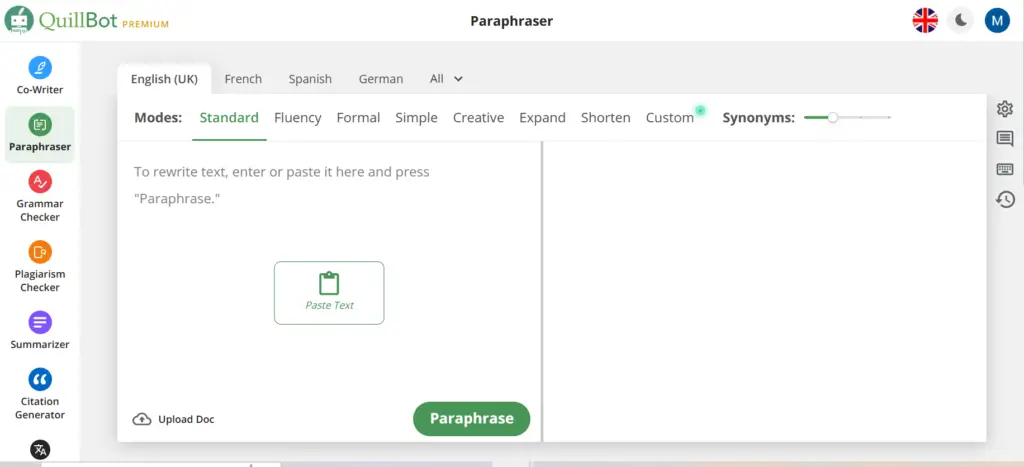
Benefits of QuillBot for Academic Researchers:
The tool has the following benefits:
- Speeds up writing: It can quickly improve our writing by eliminating words that are unnecessary and helping users to present a logical argument.
- Choosing the right synonym: It includes a built-in thesaurus capability that enables simple substitution of certain terms, helping users discover the right word every time.
- Enhancing significance and clarity: QuillBot’s writing styles allow users to express themselves freely. Whether they need grammatical corrections, succinctness, or creativity, you will get the outcomes they require right away.
- Improving vocabulary: With the help of Quill Bot’s Synonym Slider, users may quickly alter more (or less) of their content.
QuillBot is equipped with three tools.
- The Rephraser: This tool offers possibilities for synonyms and rephrasing when rephrasing our sentences.
- The Summarizer: By rephrasing your material, this tool condenses it. In essence, it helps us cut out unnecessary information from the message we want to convey.
- The Grammar Checker: This program makes sure that none of our writing has grammatical errors.

2- Best AI Tool to check references: Scite
Users can collaborate on essays and research papers using Scite’s Assistant, an AI-powered research tool that enables users to both locate evidence to support and disprove their arguments.
Users can type simple questions to receive answers based on the full texts of exploration distributions. Users of the application can obtain accurate information, browse millions of research papers, and create grant proposals or essays.
Scite responds to questions by providing responses along with a comprehensive list of all the publications cited in the answer.
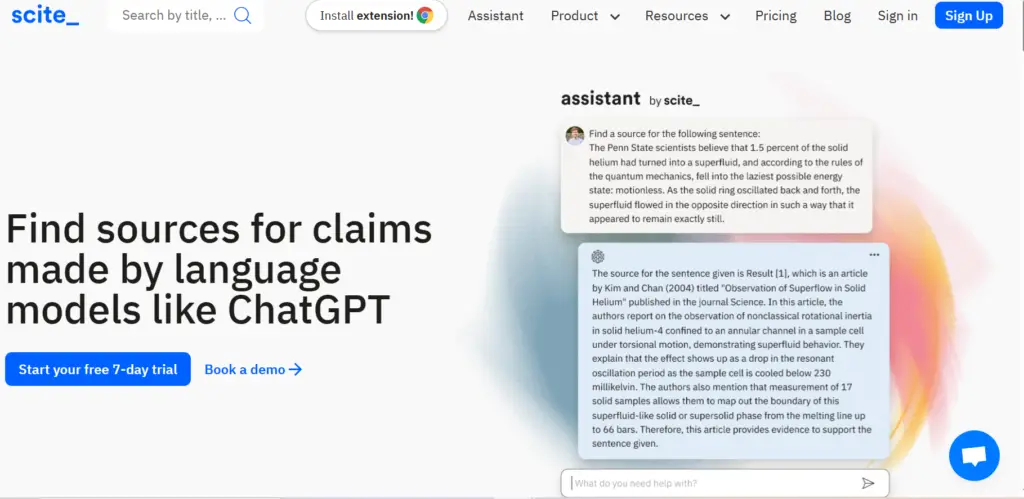
Additionally, Scite provides with the precise number if a claim made has been refuted or supported by a number of sources, such as journals or individuals. So, this is quite powerful.
3- Best AI tool for generating Answers: Consensus
Consensus also offers summaries of every research paper, making it simple to assess its relevance.
It has a similar appearance to most search engines, but what makes it unique is that you may ask it Yes/No questions, to which it responds with the academic community’s consensus.
Consensus users can also inquire about the relationships between concepts and the causes and effects of certain events. Does immigration boost the economy, for example?
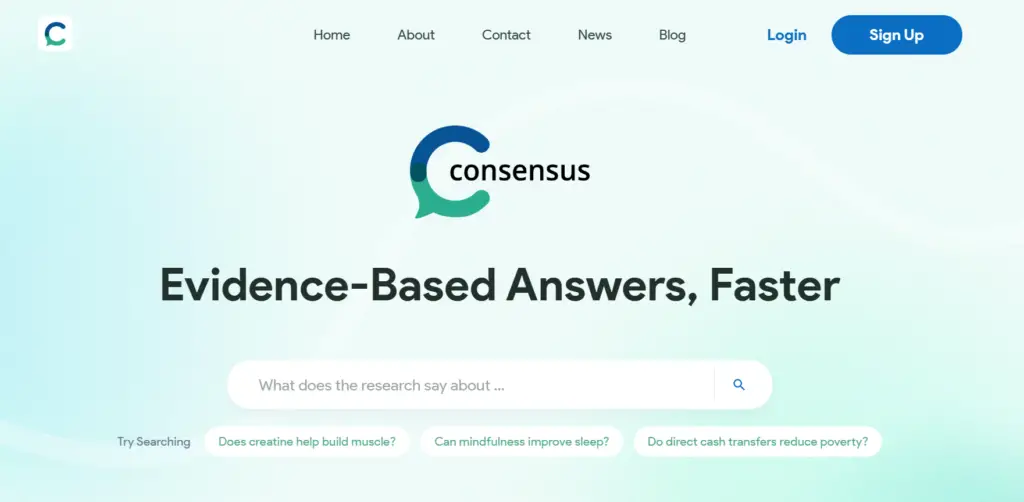
In response, consensus would say that the majority of research have discovered that immigration generally boosts the economy. It would also provide a list of the academic papers it utilised to reach its conclusion and, in the end, share the summaries of the most important articles it examined.
The AI-powered search engine is able to respond to six questions: economics, sleep, social policy, medical, and mental health and health supplements.
Peer-reviewed research is scanned by AI, which then extracts the key findings from each study. This allows people access to content from reputable scholars much more quickly than manual looking would. The findings are substantiated by data from peer-reviewed studies rather than slanted advertising, and there are no advertisements in them at all.
4- Best AI Tool for analyzing journal articles: ChatPDF
Through the AI application ChatPDF, users can have a conversation with a PDF file. Users can engage with any PDF they own, including books, research papers, manuals, articles, and legal documents, without logging in.
ChatPDF uses a ChatGPT-like next-generation AI model to understand the content of PDF files and deliver suitable answers.
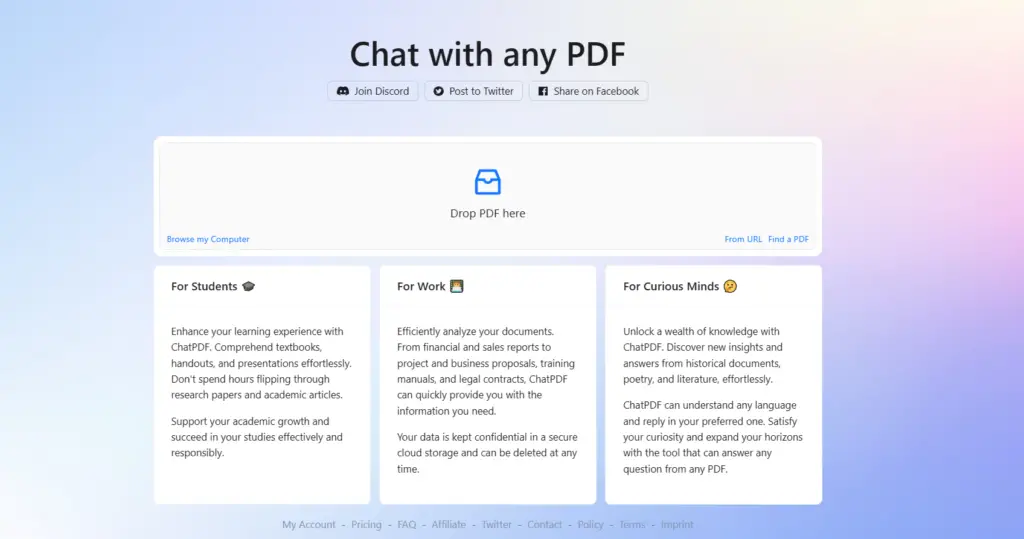
With the help of ChatPDF, reading and analyzing journal articles is now quicker and easier.
It’s like ChatGPT, but for research papers.
Users first upload the PDF of the research paper into the AI program before starting to ask it questions.
The application then generates a brief summary of the paper and presents the user with examples of questions that it could answer based on the complete article.
5- Best AI Tool to find relevant papers: Elicit
Elicit, a machine learning tool, is used by the AI research assistant to help automate research processes. Without requiring exact keyword matches, it can find pertinent articles and extract crucial information.
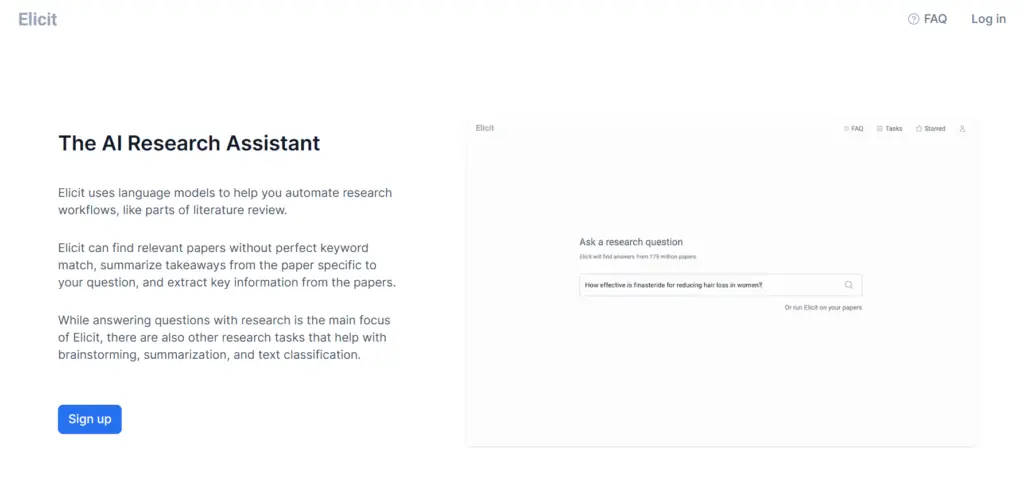
Along with providing numerous research activities like text categorization, summarizing, and brainstorming, Elicit may also highlight crucial passages from the document that are pertinent to the user’s question. This aids the user in using research to find answers to their problems while also making the research process simpler.
6- Best AI Tool Grammar Check: Trinka
For technical and academic writing, the online language editor Trinka AI was developed. It is intended to identify errors that conventional grammar checkers miss, including problems with subject-verb agreement, syntax, word choice, pronoun and article usage, and technical spelling.
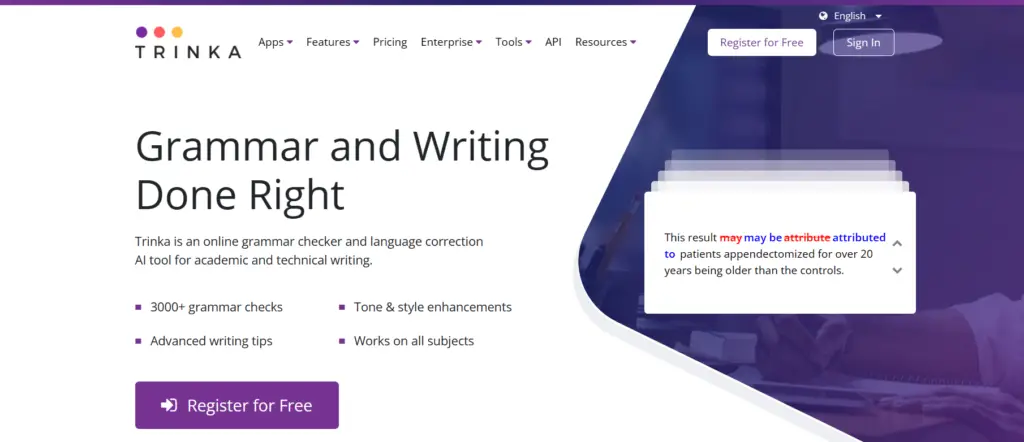
It also includes components that go beyond grammar and spelling, such as style guides, a professional tone, the use of technical terms, and conciseness. To give users the best advice, Trinka has researched the best academic journals in every discipline. It applies to many academic fields, including biology, physics, economics, engineering, chemistry, geology, social sciences, and medicine.
7- Best AI Tool for Summarization: Scholarcy
Using the online summarizing tool Scholarcy is a simple way to quickly study and assess the importance of documents like articles, reports, and book chapters. Any Word or PDF document can be used to make summary flashcards, which are then shown in an orderly and understandable manner.
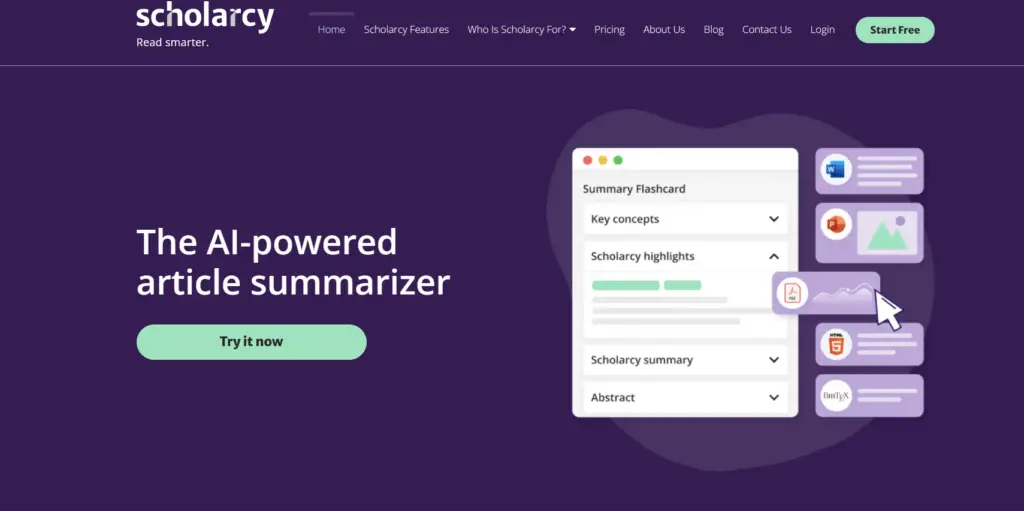
Among the services provided by Scholarcy are automatic reference extraction, open access source linking, figure, table, and image extraction.
Additionally, Scholarcy provides extensions for the Chrome and Edge browsers that link to open-access repositories and provide a searchable database of summary cards that are accessible from any device. With this AI-powered summary tool, researchers, students, journalists, librarians, and others can handle a lot of information quickly and efficiently.
8- Best AI Tool for Academic Search: Semantic Scholar
The vast majority of people are familiar with Google Scholar, which indexes scholarly papers using Google’s search engine. But if you’re conducting any kind of scientific research, you should give Semantic Scholar a try.
This AI-powered search and discovery engine provides access to more than 200 million academic papers via publisher relationships, data sources, and web crawls. To provide more pertinent search results, its AI algorithms assist you in finding previously undiscovered relationships and connections between study topics. They also offer relevant articles based on the previously saved research.

It may also automatically generate one-sentence summaries of each article to help you choose which ones to read in-depth so that you can concentrate on the most crucial details.
9- Best AI Tool for decoding Research papers: SciSpace
SciSpace is an AI-powered platform that enables users to explore, understand, and submit scientific papers. Its comprehensive searchable database contains more than 270 million articles, authors, subjects, journals, and conferences.
Its various services include a plagiarism checker, journal submission, XML converters, and an AI copilot to decipher any research paper.
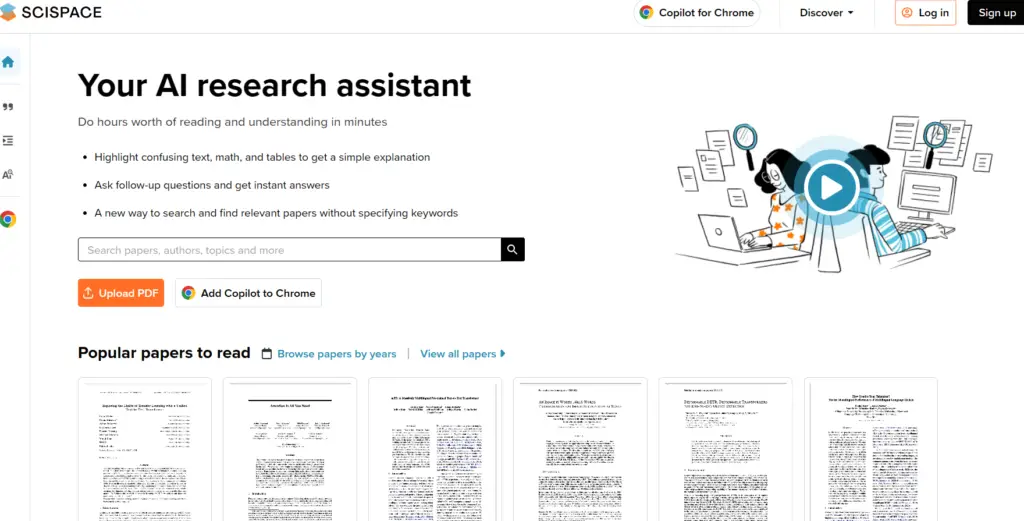
It also offers multiple paper template choices, variable pricing options, and additional services to facilitate printing. SciSpace includes a library of over 40,000 magazine designs in addition to personalised recommendations for popular articles, conferences, and themes.
10- Best AI tool to write literature reviews: OpenRead
Users of OpenRead can organise, interact with, and analyse a range of literary genres, such as essays, journals, and research materials. OpenRead is an AI-driven interactive platform.
The platform contains a number of features, including a Q&A system that answers inquiries about papers rapidly and the Paper Espresso tool, which speeds up researchers’ ability to prepare literature reviews by analysing publications.
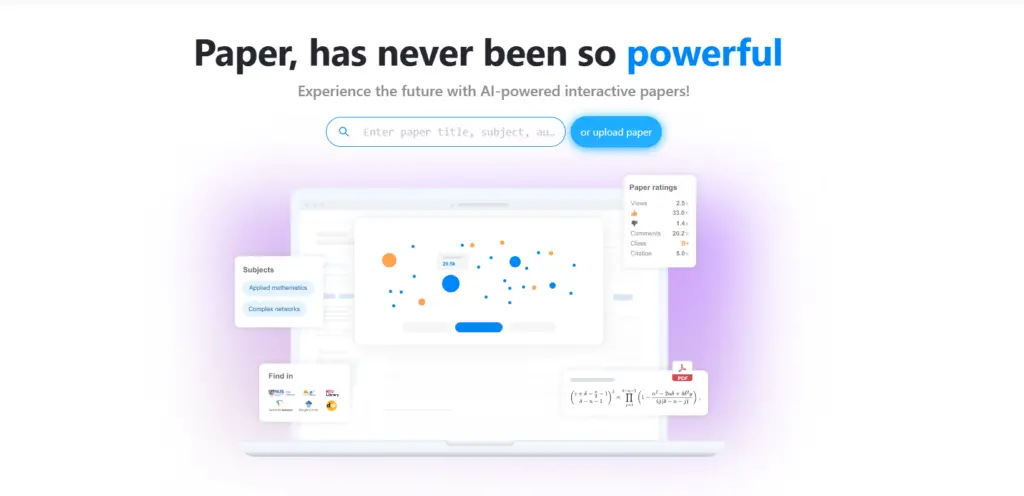
Other articles
Please read through some of our other articles with examples and explanations if you’d like to learn more.
Tools
- QuillBot
- Paraphraser.io
- Imagestotext.io
- Websites to Read Books for Free
- Tools to Convert PNG Image to Excel
- Detect AI-Generated Text using ZeroGPT and Transform It using Quillbot
- How is QuillBot used in Academic Writing?
- Tools for Presentations
- AI Tools for Citation Management
- Improve your Writing with QuillBot and ChatGPT
- Tools Transforming Knowledge Management
- Plagiarism Checkers Online
- Information Management Software
- Tools for Information Management
- Software Tools for Writing Thesis
- OpenAI WordPress Plugin
- TTS Voiceover
- Backend Automation Testing Tools
- AI Tools for Academic Research
Tech Hacks
Technology
- Firmware and Software
- WSN and IoT
- Flash Drive Vs Pen Drive
- Type A, B and C USB Cable
- Neuralink
- ReactJS
- Software Development Life Cycle Vs Software Testing Life Cycle
- Software Development Team vs Freelancer
- Quorum vs Hyperledger Fabric vs R3 Corda
- ChatGPT vs. Google Bard
- Quantum Apocalypse
- Synergy vs. KVM Switches
- eSourcing and eProcurement
- eProcurement and Traditional Procurement
- Over the Top and Video On Demand
- HDMI over IP vs HDBaseT
- Display Stream Compression
- Top Internet of Things Journals
- Supervised Learning vs. Unsupervised Learning
- Video Upscaling and Video Downscaling
- How To Build a Distributed System
- How to Get Into Data Science From a Non-Technical Background?
- How To Build Ethereum Mining Rig?
- How AI is Helpful For Marketers
- AI Chatbots Can Identify Trading Patterns
ChatGPT
- Paraphrase Text
- PowerPoint Slides
- Learn Languages
- Write Code in Python
- Write Literature Review
- Document Review
- Job Interview Preparation
- Prompts For Students
- Write Cover Letter
- Write Resume
- Write Code
- Job Applications
- Write SQL Queries
- Write Excel Formulas
- Academic Writing
- Translate Text
- Keyword Research
- Business Idea Generation
- Business Entrepreneur
- Use ChatGPT on WhatsApp
- Virtual Research Assistant
- Meta-Analysis in Research
- Large Documents
- Hypothesis Development
- Share ChatGPT Responses
- Text Analysis
- Upload PDF on ChatGPT
- Books ChatGPT



